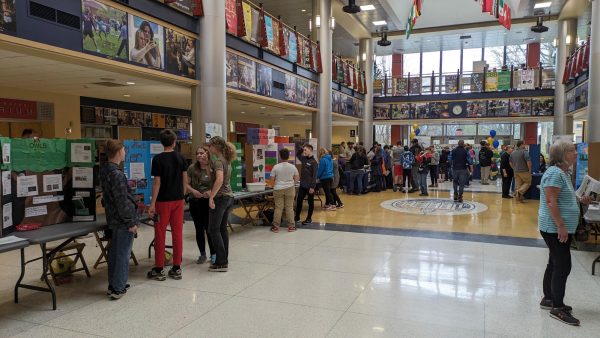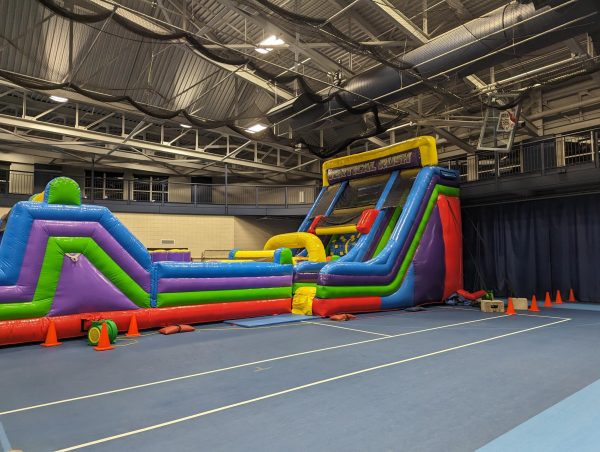Boom or bust: Allegheny’s first January term
The task of fitting an entire semester’s worth of learning into a window smaller than a month is a daunting task to students and professors alike. In June, Allegheny students were alerted of the school’s intention to roll out a two-module spring semester which is now in full swing.
The Allegheny College Health Agency specified in an email that the decision was guided by the logic that keeping students at home during the flu season would help minimize the effects of the virus on campus, especially during a time when a spike in cases was anticipated.
Though the proposed plan has quelled health concerns for the time being, it has raised just as many in regards to workload of students.
“It’s really a lot,” Michelle Miller, ’22, said. “During the weekdays I really don’t have time to do anything but work in my class.”
The heavy workload is a two-way street. Professors are putting on a juggling act as they try to manage time restraints and human fatigue while still meeting Allegheny’s rigorous academic standards.
“I had to let go of certain expectations,” said Benjamin Slote, professor of English and journalism. “I had to reconceive what would fulfill a sense of thoroughness. It’s just the nature of time and human endurance. You cannot cram the equivalent of 15 weeks of thinking and reading into three weeks.”
Despite that reality, professors must attempt to do so and the workload of this is as taxing for them as it is for students.
“In some ways it’s not the single three hours that’s so hard, I think for us it’s the piling up,” Slote said. “For me at least, I have to do a lot of prep between classes and have a fair amount of reading to do. Again, I want to make this class four credits worth of experience which means when I’m not teaching I’m getting ready to teach, and so it’s kind of wall-to-wall work.”
While this module has not been a breeze, Slote acknowledged that it should not be seen as entirely torturous. He remarked that he is enjoying his class so far and credits that to having some wonderful students.
Similarly, professors have had a lot of impact on how students have enjoyed the term so far.
“It’s been better than expected but mostly because I like the teacher and I like that she gives us two fifteen-minute breaks,” Sarah DeGrendel, ’23, said in regards to how the module has gone so far. “Since she’s taught the course before she also has it really well-organized.”
But not all professors are teaching courses that they have taught before. The current, unique circumstances have been a bright spot for Slote, who has enjoyed the opportunity to devise a brand new course that focuses on the social phenomenon of riots.
“I was in some ways trying to take advantage of this different arrangement and the intensity of it,” Slote said. “In some ways the brevity of it, in my view, allowed me to have a narrow, thematic focus.”
Whether the theme of a course is broad or narrow and whether the workload is light or heavy, there is one thing similar about each and every class during this term: it is entirely online.
This is familiar territory for both Allegheny professors and students as they all experienced some level of remote learning last semester, not to mention the entirely remote end to the 2020 Spring semester.
While the familiarity with virtual learning is there, what might not be are the students on the screen.
“I don’t think as many students are doing that as cynical faculty might think,” Slote said in regards to students leaving their laptops while muted with their cameras off during class. “But I do think that happens and that it’s a challenge to get everyone deeply engaged.
It is no secret that there are a new list of concerns when it comes to virtual learning and its effectiveness given the heightened ability to be passive.
“When you’re in-person you have the teacher there and other people around you so you feel more obligated to participate,” DeGrendel said. “I think online a lot more people can slip through.”
Some students find engaging in a virtual class challenging. This can be credited to the awkward nature of speaking to others through a screen or even the conscious nature of having to unmute as opposed to raising one’s hand.
“For me the most visceral challenge is how difficult it is to have spontaneous conversation,” Slote said. “The one-on-one is great, though.”
Although students and faculty have been understanding and adaptable, many are questioning whether or not this has become the new normal.
According to Slote the college is considering it but a final decision has not been made.
“I can’t imagine students are digging this,” said Slote.
Students’ critiques on the module go beyond the workload as many are concerned with remote learning and its impact on their college experience.
“More things can go wrong [online],” said DeGrendel. “For learning purposes I’d say in-person is probably more beneficial, but for convenience online is easier.”
Miller, who spent her entire fall semester remote, explained that her concerns were less academic related, but more social in nature.
“I definitely feel like I’m in school, but not like I’m in college,” Miller said. “If I didn’t have any health issues I would 100% go back to campus.”
Slote voiced his eagerness to read his Report of Student Experience (RSE) forms and stated that it would be “suicidal” for the college to not take into account the nature of them when making their decision to continue with the term next year.
“Some of the things that pandemic teaching has forced us to discover, necessity being the mother of invention, we can hold onto those things even when we’re having in-person classes,” said Slote. “So I vote for no more module one.”

Jordan Greynolds, '22, is a features editor for The Campus newspaper and it is his second semester on staff. He is a business and religious studies double...






